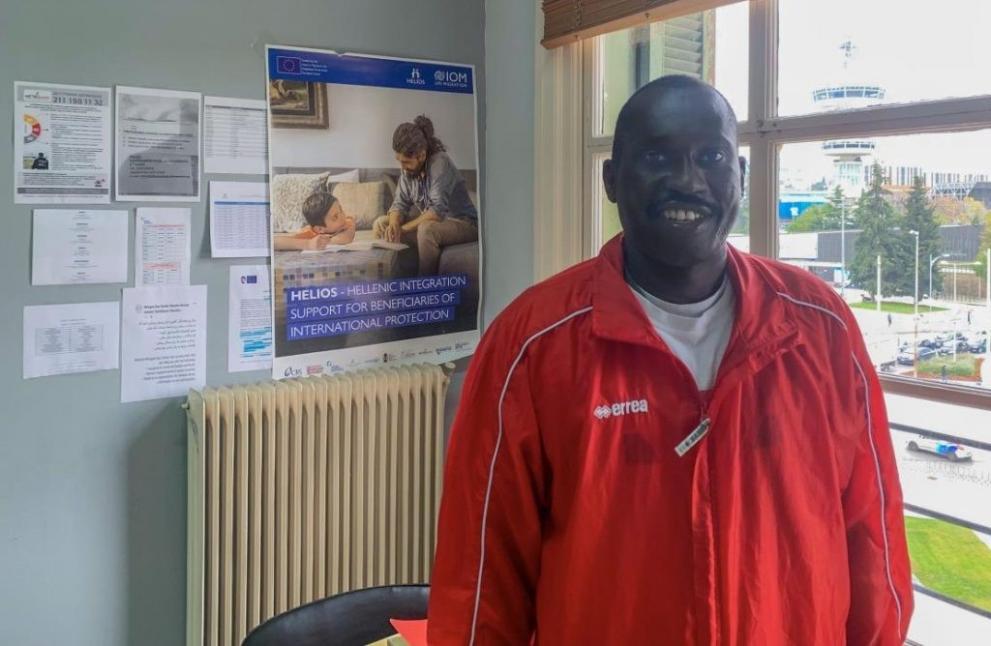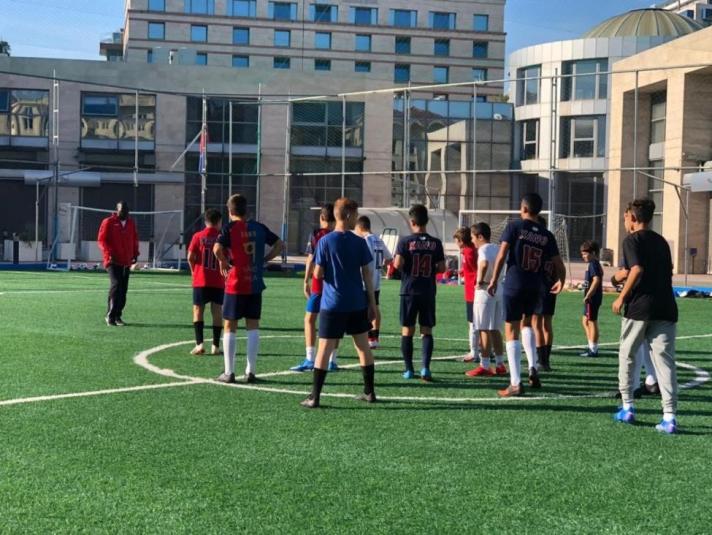
Tea Eisa has a goal: "to become part of society in Thessaloniki".
He spends his time as a volunteer for about 40 children athletes in Thessaloniki as a trainer at the YMCA’s Football Academy.
"For me, volunteering is also a way to say ‘thank you’ to Greece, which gave me the necessary documents to live and work here. I like the country and the Greek language. At some point, I want to learn Greek and I am confident I will succeed", Tea says.
Tea was a refugee from Sudan who was granted international protection in Greece, his new home. He was also placed in a programme to help him adapt to his new country.
"My participation in the programme, the job and of course the trainings give me the opportunity to get information about the city, something I need", Tea adds.
The programme Tea mentions is called the Hellenic Integration Support for Beneficiaries of International Protection (HELIOS), also usually referred to as an integration project. This project helps people to become part of a new community when they have been granted asylum, also known as international protection. Asylum is a first step. Integration into the host society requires patience and perseverance, and it takes work, organisation and planning for communities to be able to welcome new members among them. Classes and preparation in education, accommodation support, and employability are some of the courses offered by project HELIOS partners.
How does this work in Greece?
One example is the HELIOS project mentioned above, set up by the European Union and run by the International Organisation for Migration (IOM) with local NGOs. Its purpose is to help refugees integrate in local communities.
At its launch in June 2019 HELIOS received more than €60 million in EU funding. Since then about 37 775 people covered by international protection have received these welcome courses, education and vocational programmes. The project also offers accommodation support and activities that help people connect and contribute to their new community. Up to 7 062 households have been actively supported with rental subsidies.
The programme was co-funded by the European Commission through its Asylum, Migration and Integration Fund (AMIF) and the Greek government.
The HELIOS project is implemented by the International Organisation for Migration with the support of several NGOs active on the ground. It has helped thousands of people make Greece their new home. For instance:
Karimi Saidullah, a 52-year-old recognised refugee from Afghanistan, who came to Greece with his family five years ago. Karimi’s goal is to create his:
"own laboratory for the manufacturing and maintenance of mobility equipment such as wheelchairs, crutches, sticks and walkers".
For this reason, aside from the experience in Afghanistan, he obtained a welding certification in Greece.
"This gives me the opportunity to seek a job in companies that are active in the field", says Karimi Saidullah.
Another person helped by the programme was Nina from Cameroon who says
"Even though I’m not a very outgoing person, I have made friends in Greece".
She works remotely for a big customer service company and also studies Finance through an Alba Graduate Business School scholarship program.
"A Greek-Cameroonian family are the closest people to me. We share time together, talking about life in Greece, our kids and aspirations, I love Athens, I love the fact that no one has the right to tell me how I am supposed to live, to be, or what to become."
Greece and the EU working together on integration
EU countries and local authorities develop their own integration strategy, models and actions to welcome refugees and asylum seekers. The EU Action Plan on Integration and Inclusion helps countries in these actions through funding tools and exchange of know-how. Financing is of utmost importance, as integration is a lengthy process and budget availability ensures long-term planning and implementation.
In recent years, the European Commission and the European Union Agency for Asylum (EUAA) have supported Greece to improve its asylum system. Processing of asylum applications became faster: between 2019 to July 2022 more than 84 760 decisions of international protection (refugee status and subsidiary protection) were issued in comparison to the period between 2016 and 2018 with 28 636 issued decisions.
More information
The EU actively supports Greece in managing migration. Last year three new reception centres were built on the islands of Leros, Kos and Samos through EU grants. And until today almost 5 000 asylum seekers have been relocated from Greece to other European countries thanks to financial and organisational support from the EU. Supporting and investing into integration actions in Greece is key to a fully functional migration policy.
From June 2019 to December 2021, the European Commission funded the HELIOS project through the 2014-2020 Asylum, Migration and Integration Fund (AMIF), with more than €60 million. Thanks to this funding various integration actions were carried out all around Greece with IOM as the main beneficiary and by the following project partners:
- Catholic Relief Services (CRS)
- Danish Refugee Council Greece (DRC Greece)
- Greek Council for Refugees (GCR)
- Solidarity Now
- INTERSOS
- Municipality Development Agency Thessaloniki S.A (MDAT)
- Metadrasi
- PLOIGOS
- Public Benefit Enterprise of the Municipality of Levadea (ΚΕDIL)
The HELIOS project continues
The HELIOS project is currently the main integration project in Greece and as of 1 January 2022 the Greek Authorities took over its management and funding. The EU plans to continue the co-funding of the project to ensure its long-term continuation.
Integration policies and actions in Greece continue to develop. In 2021 Greece appointed a Deputy Minister in charge of Integration and developed its own National Strategy on Integration. This shows that Greek authorities are carrying out preparations for more integration actions taking advantage of the tools provided in the new programming period of AMIF 2021-2027.
Details
- Publication date
- 14 September 2022
- Author
- Directorate-General for Migration and Home Affairs



